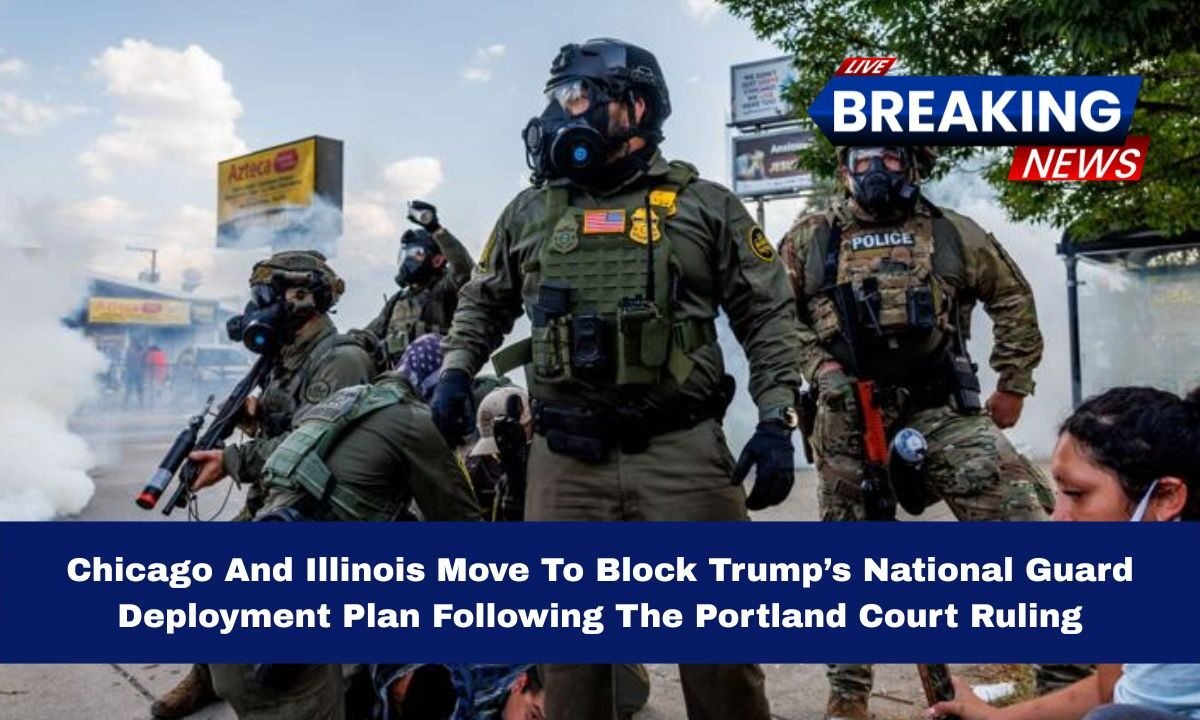Chicago and the State of Illinois have initiated legal action to block President Trump’s plan to deploy National Guard troops to the city, following a recent federal court ruling in Portland that significantly constrained similar deployment efforts.
With escalating tensions over federal versus state authority, this case could set a crucial legal precedent.
Background- The Portland Decision and Its Ripple Effect
Earlier this week, a federal court in Oregon issued a temporary restraining order (TRO) that prohibited the federal government from federalizing and deploying National Guard troops into Portland.
The court held there was no sufficient legal justification for overriding state control of the Guard in that context. In light of that decision, states like Illinois have seized the opportunity to challenge the Trump administration’s plans for Chicago.
What Illinois and Chicago Are Doing
On October 6, 2025, Illinois Attorney General Kwame Raoul filed suit seeking a temporary restraining order to prevent the deployment of National Guard units to Chicago under federal control.
The state argues such a deployment would violate constitutional principles, overstep statutory limits, and jeopardize public trust.
At a similar time, city officials, including Mayor Brandon Johnson, described the plan as effectively an “invasion,” accusing federal authorities of attempting to circumvent local governance and impose a militarized presence.
The city has moved to limit federal use of municipal property (e.g. buildings, staging areas) in anticipation of a federal push.
A district court judge in Chicago declined to immediately grant a block on the deployment, but left the door open for full hearings and future orders.
The lawsuit and its supporting motion remain active.
Key Issues & Legal Arguments
1. Control of the National Guard
Under standard practice, a state’s governor commands its National Guard unless a specific legal exception triggers federalization (for example, under the Insurrection Act).
Illinois contends that the Trump administration’s plan exceeds permissible bounds and attempts to co-opt the Guard for general domestic enforcement actions—a role state law does not permit.
2. Scope & Justification of Deployment
Illinois argues the federal plan is politically driven, lacking proportionality or clear public safety rationale.
The state claims deploying hundreds of troops to Chicago will inflame tensions rather than restore order. Chicago officials echo that concern, warning of escalated confrontation and friction between citizens and unfamiliar federal forces.
3. Precedent & Multiple State Actions
The litigation in Illinois is closely tied to actions in Oregon and California, where state officials successfully obtained injunctions limiting federal intrusion into Guard operations.
Illinois and Chicago aim to extend that emerging jurisprudence into the Midwest, establishing that federal power is not limitless when it comes to domestic deployment of military resources.
Latest Facts & Figures
| Item | Current Status / Figure |
|---|---|
| Date of Illinois lawsuit | October 6, 2025 |
| Court action in Chicago case | TRO request filed; not immediately granted |
| Portland TRO date | Early October 2025 |
| Troop deployment cited | Discussions of hundreds of Guard troops for Chicago; larger mobilization of thousands in nearby states |
| Entities opposing deployment | State of Illinois, City of Chicago, Governor JB Pritzker, Mayor Brandon Johnson |
| Primary legal claim | Overreach, violation of state sovereignty, misuse of Guard forces for domestic policing |
| Key legal hinge | Whether federalization outside narrow statutory authority violates constitutional and statutory guard-control limits |
What’s at Stake & What to Watch
- Appeals & court deadlines: The case in Chicago will likely see fast-tracked hearings and appeals. The outcome in the Oregon/Portland appeals court may heavily influence how the Illinois case unfolds.
- Deployment in practice: If federal forces begin moving in despite ongoing litigation, Illinois and Chicago may seek emergency relief or restraining orders mid-action.
- Broader precedent: A favorable ruling for Illinois could reshape the balance of federal vs state authority over National Guard deployments across the country.
Chicago and Illinois have mounted a bold legal challenge to President Trump’s proposed National Guard deployment, leveraging the momentum from the Portland court ruling.
Though the initial motion id not secure an immediate block, the stage is set for a decisive showdown over federal authority, state sovereignty, and the proper use of guard forces in domestic settings.
The coming days and rulings will determine whether the federal plan proceeds or is curtailed by constitutional limits and judicial pushback.




